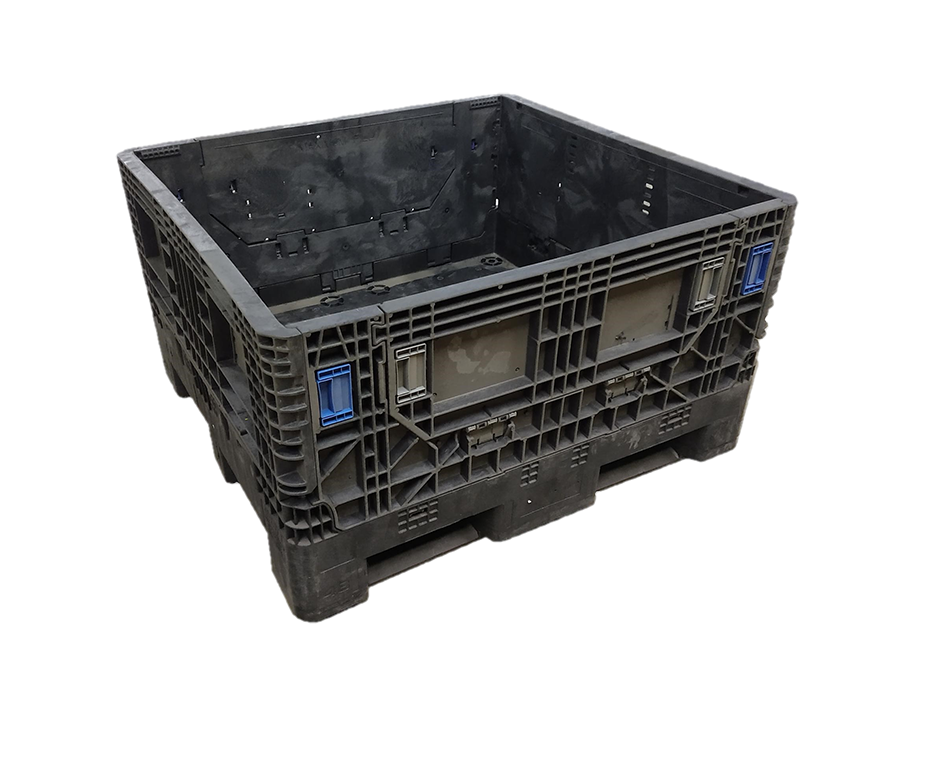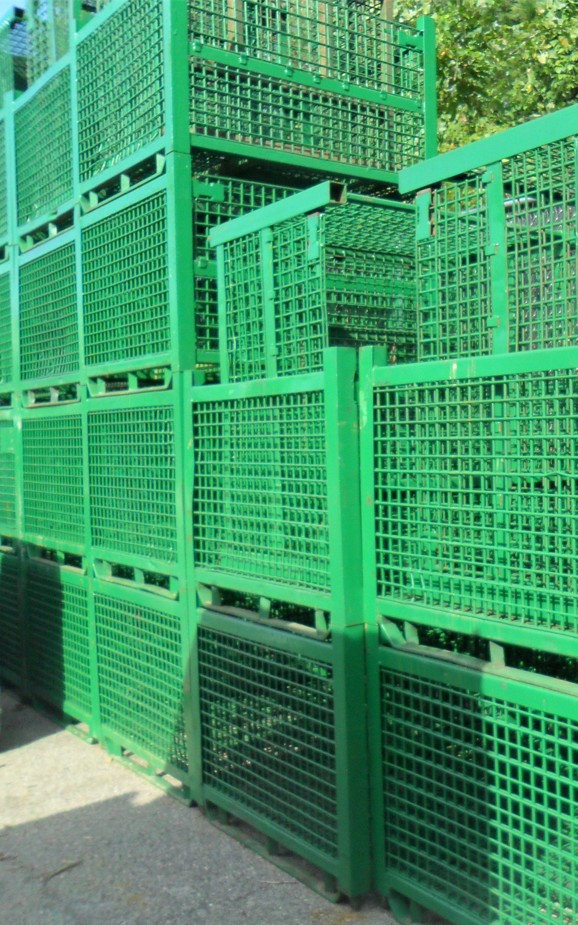The Ultimate Guide to Picking the Right Bulk Containers for Your Business Demands
Picking the suitable mass containers is important for any kind of service that counts on efficient logistics. Different kinds of containers exist, each developed for certain materials and applications. Elements such as size, product compatibility, and regulative standards play a significant role in this decision-making process. Understanding these components can result in enhanced operational performance. Nonetheless, several businesses ignore crucial elements that could improve their general performance and sustainability. What are these factors to consider?
Recognizing Different Sorts Of Bulk Containers
Bulk containers work as vital tools for companies seeking efficient storage and transportation options. These containers come in different types, each designed to satisfy specific functional requirements. One usual kind is the intermediate mass container (IBC), which is excellent for fluid and granulated products, offering a balance of capacity and ability to move. One more popular choice is the bulk bag, or FIBC, ideal for dry, flowable products. These flexible containers are light-weight and can be easily moved and saved. For larger materials, inflexible bulk containers are often employed, offering sturdiness and security for risk-free handling. In addition, there are specific containers tailored for dangerous products, making sure conformity with security regulations. Understanding the distinctive characteristics of these mass container kinds enables services to make enlightened decisions that optimize logistics and minimize prices. By selecting the best container, business can boost their operational performance and simplify their supply chain processes.
Trick Material Factors To Consider for Bulk Containers
When picking mass containers, it is vital to contemplate the materials made use of in their building and construction. Factors such as chemical, strength, and durability compatibility play an important duty in making certain the containers satisfy certain functional requirements. Furthermore, weight and portability worries can impact both efficiency and transportation logistics.
Material Sturdiness and Stamina
Toughness and strength are essential consider picking products for mass containers, as they straight affect the container's ability to endure different environmental conditions and managing procedures. Products such as high-density polyethylene (HDPE), polypropylene, and stainless-steel are typically favored for their durable properties, using resistance to abrasion, temperature, and effect variations. The choice of material additionally affects the total life expectancy of the container; more powerful products normally lead to less constant replacements, resulting in set you back savings over time. In addition, the weight of the product can influence delivery costs and simplicity of handling. Organizations should consider their details functional atmospheres and the possibility for wear and tear to ensure peak durability and toughness in their mass container option.
Chemical Compatibility Factors
Recognizing chemical compatibility is crucial for choosing mass containers, as the materials utilized should withstand the particular compounds they will hold. Various factors affect compatibility, including the chemical nature of the materials, temperature level, and period of storage space. As an example, destructive chemicals might call for containers made from stainless-steel or specialized plastics that resist degradation. Furthermore, reactive materials can generate warm or gases, requiring aired vent or pressure-rated containers. The option of container material, whether polycarbonate, metal, or polyethylene, need to align with the chemical residential or commercial properties of the kept compounds to avoid breaches or leakages. Ultimately, a detailed examination of these compatibility elements guarantees risk-free handling and storage, securing both employees and the atmosphere while maintaining item integrity.
Weight and Portability Problems
Picking bulk containers entails not just evaluating chemical compatibility however additionally considering weight and mobility. Businesses need to assess the ease of handling and transportation to enhance efficiency. Light-weight products like high-density polyethylene (HDPE) or aluminum can promote easier activity and lower shipping costs. Alternatively, larger containers may supply enhanced resilience however can prevent movement, particularly in settings requiring constant moving. Furthermore, the design of the container need to permit practical lifting and stacking, guaranteeing ergonomic security for workers. Firms ought to additionally take into consideration the infrastructure offered for transport; for instance, containers suitable with forklifts or pallet jacks can improve procedures. Ultimately, the right equilibrium in between weight and portability straight affects operational performance and price performance.
Sizing Your Bulk Containers for Ideal Efficiency
When sizing mass containers, organizations have to thoroughly assess the dimensions required to accommodate their specific items. Furthermore, weight capacity is a vital factor that affects performance and safety during transport and storage space. Efficient sizing not only makes the most of room yet likewise enhances functional workflows.
Figuring Out Container Dimensions
Picking the ideal dimensions for mass containers is important for maximizing performance in storage and transportation. Companies have to assess their specific needs, taking right into account factors such as readily available area, the nature of the goods being saved, and the methods of transport utilized. Precise measurements guarantee that containers fit ideally in stockrooms and cars, minimizing squandered area and minimizing managing time. Requirement dimensions can use benefit, yet customized measurements could be necessary for special requirements or to fit details products. Furthermore, it is very important to examine stacking capabilities and ease of access, as these aspects influence general operational effectiveness. Ultimately, the ideal dimensions result in enhanced company and streamlined logistics, profiting the general efficiency of business.
Weight Capacity Considerations
Understanding weight capability is crucial for businesses intending to maximize their mass container effectiveness. The weight ability of a container directly impacts storage space abilities, transport logistics, and general functional costs. Choosing containers with the suitable weight limitations guarantees that companies can safely keep and move their products without running the risk of damage or compliance problems. Straining containers can result in structural failings, while underutilizing capability cause wasted resources. It is essential for businesses to assess their product weights and consider any type of governing needs when selecting containers. Furthermore, variables such as the kind of material, intended use, and ecological problems need to likewise affect weight capacity decisions. By assessing these aspects, businesses can boost efficiency and assure a structured supply chain.
Regulative Conformity and Safety Requirements

Regulatory conformity and security criteria play a vital duty in the option of bulk containers for companies. Organizations should guarantee that their containers satisfy numerous guidelines set by local, nationwide, and worldwide authorities. These standards commonly refer to product safety, architectural honesty, and appropriate labeling, which help prevent mishaps and guarantee the safe transport of goods.
In addition, adherence to industry-specific guidelines, such as those from the Food and Medicine Administration (FDA) or the Occupational Safety and Health Administration (OSHA), is vital for business handling hazardous products or foodstuff. Non-compliance can result in fines, lawful concerns, or damages to a business's online reputation.
Companies need to also consider the container's compatibility with the materials being stored or transferred to avoid contamination or chemical responses (used plastic containers). To summarize, recognizing and carrying out governing conformity and security requirements is crucial for the reliable and responsible use of mass containers
Sustainability Alternatives for Eco-Friendly Bulk Containers

Business are likewise discovering options made from recycled products, which not only preserve sources yet also support the recycling market. Furthermore, innovations in style permit lighter containers that require less energy to transport, additionally boosting sustainability. By integrating these environmentally friendly bulk container choices, services can demonstrate their commitment to environmental stewardship while satisfying customer need for lasting practices. This change not only aids the world however can additionally boost brand track record and consumer loyalty.
Cost-Effectiveness and Budgeting for Bulk Containers
While many organizations concentrate on sustainability, cost-effectiveness continues to be an important variable when picking mass containers. Organizations should analyze the preliminary purchase price, along with lasting functional costs, to ensure monetary feasibility. Elements such as maintenance, reusability, and sturdiness play a considerable duty in identifying general expenditures.
Purchasing top quality containers may generate greater ahead of time prices but can bring about financial savings through reduced replacement prices and decreased waste. Additionally, businesses ought to think about transport expenses and storage performance, as these can impact the total spending plan.

Often Asked Questions
How Do I Figure Out the Right Container for Hazardous Products?
To establish the ideal container for hazardous materials, one have to review compatibility with the compound, think about the container's material, check for regulatory compliance, and analyze ability and security attributes to assure appropriate handling and storage.
Can Bulk Containers Be Personalized for Details Products?
Yes, bulk containers can be customized for particular products. used collapsible bulk containers. Different attributes, such as style, material, and dimension, can be customized to meet special needs, ensuring perfect security and performance for carrying and saving different products
What Is the Ordinary Life-span of Different Mass Container Kind?
The ordinary life-span of bulk container types differs; plastic containers last 5-10 years, steel containers 10-20 years, and wood containers normally last 3-7 years, depending upon usage, upkeep, and environmental problems.
Exactly how Should I Tidy and Maintain Mass Containers?
To clean up and keep bulk containers, one should consistently inspect for damages, remove residue, wash with suitable cleaning agents, wash thoroughly, and assurance correct drying out before storage space. Following producer guidelines enhances durability and safety and security throughout usage.
Exist Rental Choices for Mass Containers Available?
Yes, countless companies supply rental alternatives for bulk containers, giving flexibility for organizations. These rentals can fit various requirements, permitting firms to handle inventory effectively without the dedication of buying containers outright.
Durability and toughness are essential variables in selecting materials for bulk containers, as they directly influence the container's capability to endure different ecological conditions and dealing with processes. Recognizing chemical compatibility is crucial for picking mass containers, as the materials made use of should resist the details materials they will certainly hold. Recognizing weight ability is crucial for organizations intending to optimize their bulk container performance. Regulative conformity and safety standards play an essential function in the option of bulk containers for companies. more info While many services focus on sustainability, cost-effectiveness continues to be a vital aspect when choosing bulk containers.